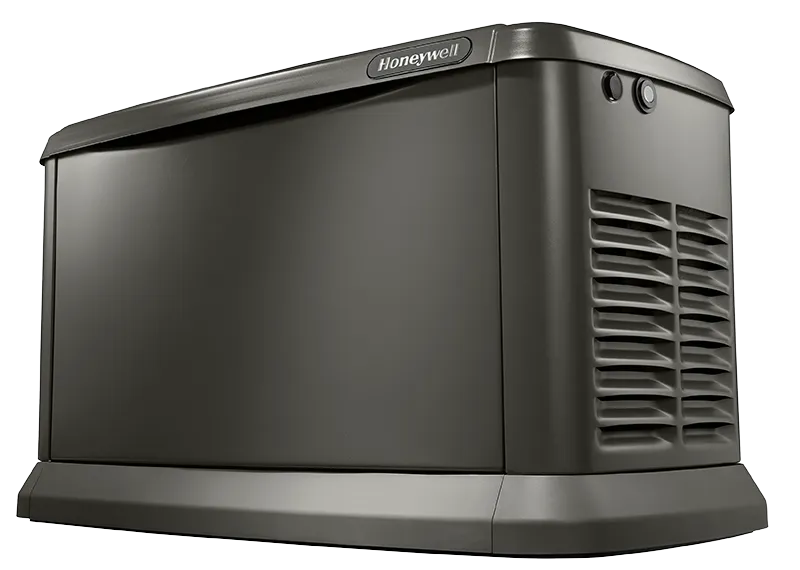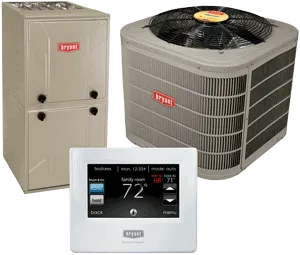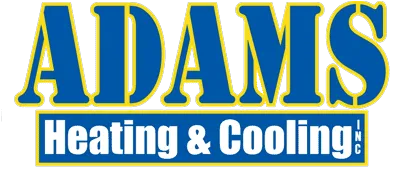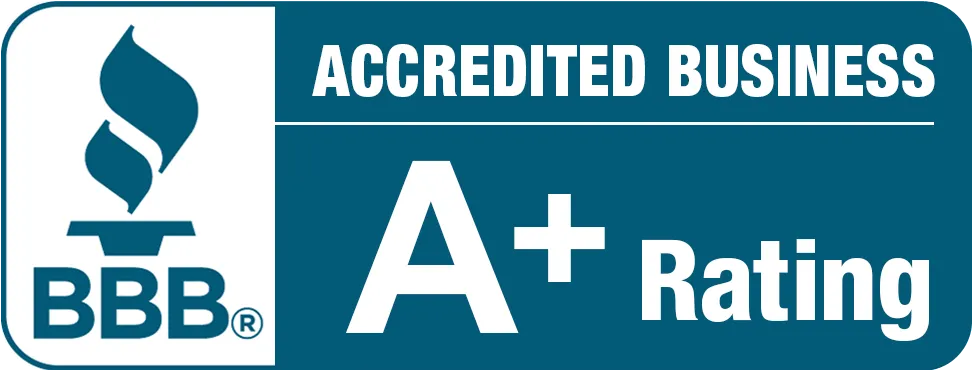Adams Heating & Cooling
HVAC Experts You Can Trust
Serving Tuscaloosa, AL, Birmingham, AL, and surrounding areas since 1982

What Every Homeowner Should Know About Generators
Have you ever experienced a power outage and wished you had a reliable backup solution? In today's fast-paced world, where electricity is essential for our daily routines, having a backup generator is crucial. Whether you are a homeowner or a business owner, being prepared for unexpected power outages can save you a lot of hassle and discomfort.
In this article, we will discuss the things every homeowner should know about generators. From the benefits of having an electric backup generator to the importance of proper installation and repair services, we will guide you through everything you need to know.
Understanding Generators
Why Every Homeowner Needs a Generator
Generators play a vital role in ensuring that your home remains functional and comfortable, even during unexpected power outages. A generator acts as a safeguard, providing electricity to keep essential appliances running. This includes refrigeration for food safety, heating and cooling systems for comfort, and power for medical devices.
In areas where storms or natural disasters can lead to prolonged power losses, having an electric backup generator can be especially critical. Moreover, it ensures that lighting and security systems continue to operate, which adds a layer of safety and security to your home.
In essence, a generator is not just about convenience, it's about providing a reliable contingency for your family's well-being and peace of mind in times when the electrical grid fails.
Key Components of a Generator
A generator is a complex piece of machinery composed of several key components that work together seamlessly to convert fuel into electrical power, ensuring a reliable energy source during outages or in remote locations. Below, we’ll take a closer look at each essential part and its role in generator operation.
Engine
Often referred to as the “heart” of the generator, the engine is responsible for creating the mechanical energy needed to produce electricity. It’s powered by various fuel sources, such as natural gas, diesel, or propane, each of which impacts performance, efficiency, and cost. Diesel engines, for instance, are known for their durability and long operational life, while natural gas engines are cleaner and less costly to run. The size and power output of the engine determine the generator's overall capacity, making it crucial to match the engine size to the energy demands.Alternator (Generator Head)
The alternator is where mechanical energy transforms into electrical power. Driven by the engine, the alternator consists of a rotor and a stator, which work together to create an electromagnetic field. As the rotor spins within the stator, it generates an electric current. This component’s efficiency and quality directly affect the generator’s electrical output, making it a critical part of the setup.Fuel System
The fuel system includes a fuel tank, fuel pump, fuel lines, and injectors, providing the engine with a continuous supply of fuel. Fuel tanks vary in size based on the generator’s intended run time and fuel type. Additionally, fuel filters are part of this system to prevent contaminants from reaching the engine, ensuring clean and efficient combustion. In larger units, an auxiliary fuel tank or automated refueling system may also be present for extended operation.Voltage Regulator
The voltage regulator controls and maintains the output voltage within a specified range, ensuring a consistent electrical output regardless of load fluctuations. It works by adjusting the excitation of the generator’s alternator to stabilize the voltage. Without a proper voltage regulator, electrical equipment connected to the generator could suffer from inconsistent power, potentially causing damage.Cooling and Exhaust Systems
During operation, the generator engine produces substantial heat that must be dissipated to prevent overheating. The cooling system, typically composed of a radiator, coolant, and a fan, keeps the engine temperature in check. Meanwhile, the exhaust system manages the safe expulsion of emissions, such as carbon monoxide, produced during combustion. These systems ensure both safe and efficient generator operation, especially in enclosed or residential spaces.Lubrication System
Since generators have numerous moving parts, the lubrication system minimizes friction and wear, promoting a longer lifespan and reliable performance. It uses oil to reduce friction in the engine and alternator components. Routine checks and oil changes are necessary to maintain optimal lubrication, preventing breakdowns and extending the generator’s operational life.Battery Charger
Generators require an initial electrical charge to start, which is typically provided by a battery. The battery charger keeps the battery fully charged and ready for immediate use. Automatic battery chargers prevent battery discharge, especially in standby units, ensuring that the generator is always ready for startup during power outages.Control Panel
Acting as the user interface, the control panel allows operators to start, stop, and monitor the generator’s functions. It displays critical information such as voltage output, oil pressure, engine temperature, and other diagnostics. Some modern control panels offer digital displays and even remote monitoring options, enabling real-time tracking of the generator’s performance and status.
Understanding these components not only improves your knowledge of how generators work but is also essential for maintaining your unit. Proper maintenance and care for each part ensure that your generator will function effectively and reliably, providing peace of mind during emergencies and critical power needs.
The World of Electric Backup Generators
Why Electric Backup Generators are Essential
Electric backup generators are essential because they provide a dependable source of power during outages. They ensure that your daily life remains uninterrupted, powering everything from lights and appliances to heating and cooling systems.
In emergencies, having a generator means the difference between comfort and hardship. They are particularly important in areas prone to severe weather, where power can be out for extended periods.
For families with special medical needs that require electrically powered equipment, an electric backup generator can be life-saving.
Businesses also benefit from generators, as they prevent downtime and loss of revenue during outages, among other reasons.
By maintaining power, electric backup generators protect against data loss and help keep communication lines open, proving their critical role in both residential and commercial settings.

Installation Process of Electric Backup Generators
The installation of an electric backup generator is a multi-step process that’s best left to certified professionals to ensure everything is done safely, efficiently, and according to local codes. Here’s what you can expect during each stage of the installation process.
1. Site Assessment and Selection
Your installer will start by assessing your property to choose the ideal location for your generator. They’ll consider several factors, such as:
Proximity to Fuel Source: Your generator needs to be close to its fuel source, whether that’s natural gas, propane, or diesel, allowing for a safe, secure connection.
Ventilation Requirements: Since the generator emits exhaust gases, it will need to be placed in a well-ventilated area, typically at least five feet away from windows, doors, or vents, reducing any risk of carbon monoxide entering your home.
Accessibility for Maintenance: The location also needs to allow easy access for regular maintenance and inspections.
2. Foundation Preparation
Next, a concrete pad or foundation is prepared to support the generator’s weight and keep it level. This base prevents unnecessary movement, minimizes vibrations, and ensures your generator remains stable over time. Once installed, it can help secure the generator during severe weather.
3. Connecting to the Fuel Supply
After the generator is in place, it will be connected to your fuel source:
Natural Gas or Propane: Your generator can be hard-plumbed into these sources, ensuring a constant fuel supply so you never need to refill it manually.
Diesel: For diesel generators, your installer will set up a fuel tank, and you’ll need to plan for refueling as necessary.
The installer will inspect all connections for leaks, ensuring everything meets safety standards and is ready to go.
4. Electrical Integration with Transfer Switch
The critical step is connecting your generator to your home’s electrical system through a transfer switch, which will be installed near your main electrical panel. This switch is key to a smooth transition during a power outage by:
Isolating Power Sources: The transfer switch prevents backfeeding by isolating the generator and utility power, keeping utility workers safe during repairs.
Ensuring Automatic or Manual Operation: Depending on the setup, the transfer switch may automatically detect power outages and start the generator or require you to activate it manually.
5. Final Testing and Safety Checks
With installation complete, your installer will perform a series of tests to ensure everything runs smoothly. This stage includes:
Startup and Load Testing: Your installer will simulate a power outage to check your generator’s response time and ability to handle the load.
Safety Inspections: They’ll inspect fuel lines, electrical connections, and ventilation to make sure all systems are secure and operating correctly.
User Orientation: You’ll get a basic walkthrough of how to operate your generator and what maintenance is needed.
6. Post-Installation Considerations
Regular maintenance, like oil changes, filter replacements, and inspections, will keep your generator in top condition. You might want to consider a maintenance contract to ensure your generator is always ready when you need it.
Following these steps will ensure that your electric backup generator is set up to safely and reliably power your home whenever an outage occurs, giving you peace of mind and uninterrupted service.
Keeping Your Generator in Top Shape
Regular Maintenance for a Smooth-Running Generator
To ensure your electric backup generator operates smoothly when you need it most, regular maintenance is key. This includes routine inspections to check for any wear and tear, replacing worn-out parts before they fail, and ensuring the generator is clean and free from debris.
It's important to check oil levels and change the oil according to the manufacturer's schedule, as well as replace air and fuel filters regularly. Battery inspection and care are also crucial since a failed battery can prevent a generator from starting.
Additionally, running the generator periodically, even when there's no power outage, ensures that it remains in good working order and highlights any issues that may need attention.
By keeping up with scheduled maintenance with a maintenance plan, you can extend the life of your generator and avoid the inconvenience of unexpected breakdowns during critical times.
Common Generator Problems and Solutions
Generators can face several common issues that impact performance. Here’s a look at some frequent problems and how you can handle them:
Battery Failure
A dead battery is one of the main reasons generators won’t start. To avoid this, test your battery regularly and recharge it as needed. Replacing an old battery before it fully deteriorates can save you from a stressful situation when power is out.Fuel Leaks
Fuel leaks are often due to cracked fuel lines, loose connections, or worn seals. Leaks not only waste fuel but can also be a fire hazard. Check your generator’s fuel lines and connectors for any signs of wear, and replace damaged parts as soon as you spot them to keep everything running safely and efficiently.Starting Issues from a Clogged Air Filter
If your generator has trouble starting, a clogged air filter might be the cause. Dust and debris can build up over time, restricting airflow to the engine. Replacing the air filter on a regular schedule keeps the engine running smoothly and prevents starting issues.Rough Running or Stalling (Carburetor Issues)
If your generator stalls or runs roughly, the carburetor could be to blame. The carburetor controls the mixture of fuel and air, and buildup inside it can disrupt performance. Cleaning or adjusting the carburetor can solve this issue. In more complicated cases, consider having it checked by a professional.Electrical Malfunctions
Electrical problems—like malfunctioning transfer switches, blown fuses, or worn-out capacitors—are common and can prevent power from transferring properly. Since transfer switches are critical for shifting power from the grid to your generator, keeping them in top shape is key. Schedule inspections by an electrician to identify and replace any faulty components before they can cause issues.
Keep Your Generator Ready When It Matters Most
By being aware of these common issues and addressing them proactively, you can keep your generator in peak condition and ready for use. Regular maintenance, timely repairs, and professional inspections go a long way toward ensuring that your generator is there for you whenever you need it most.
Making the Investment
The Long-Term Savings of Having a Generator
Investing in an electric backup generator can lead to significant long-term savings for homeowners. During power outages, the cost of temporary solutions or the losses from spoiled food and damaged electronics can quickly add up. A generator helps avoid these expenses by providing immediate power.
Furthermore, for those who work from home, a generator ensures that work and productivity are not disrupted, potentially preventing loss of income. In regions prone to extreme weather, the generator can keep heating and cooling systems running, protecting against costly repairs due to frozen pipes or heat damage.
Additionally, having a generator can contribute to lower insurance premiums by reducing the risk of claimable losses during power outages. Over time, the upfront cost of purchasing and installing a generator is often offset by the prevention of these incremental and sometimes substantial expenses.
Financial Aspects: Generator Costs vs Benefits
When considering the financial aspects of acquiring a generator, it's important to weigh both the initial costs and the ongoing benefits. The initial investment includes the purchase price of the generator, which varies based on size and capacity, and the cost of professional electric generator installation.
There are also ongoing costs to consider, such as fuel, maintenance, and potential electric generator repair services. However, these costs must be balanced against the benefits. A generator provides power during outages, preventing disruptions that can lead to expensive losses. It also adds value to your property and can be a selling point for potential buyers who value preparedness.
Overall, the peace of mind and financial protection offered by a generator often outweigh the costs, making it a wise investment for many homeowners.

Seizing the Opportunity
How to Schedule an Electric Generator Installation
Scheduling an electric generator installation is straightforward. Start by researching reliable service providers with expertise in electric backup generators.
Once you've selected a provider, reach out to discuss your needs. They should offer a consultation to assess your home's energy requirements and recommend an appropriate generator size. During the consultation, ask about the installation process, timeline, and any preparations you need to make.
The service provider should also inform you about the local permits and inspections required. After the details are settled, you can schedule the installation at a time that's convenient for you. Remember, professional installation is crucial for safety and compliance with local codes. By choosing a trusted service provider, you ensure that your generator will be installed correctly and ready to go when you need it most.
Why You Should Choose Our Reliable Service
Choosing Adams Heating and Cooling’s reliable service for your electric generator installation and repair needs means you're partnering with a team of dedicated professionals. We pride ourselves on our expertise and commitment to customer satisfaction.
Our technicians are highly trained and experienced, ensuring that every installation or repair is performed with attention to detail and in compliance with the highest safety standards. We are responsive and reliable, understanding the importance of having a functional generator, especially during emergencies.
Our service extends beyond installation; we provide comprehensive maintenance and support to keep your generator in top condition. By choosing us, you're not just getting a service provider—you're gaining a partner who is invested in the safety and comfort of your home. Trust us to deliver quality, reliability, and peace of mind with every job.
So, don't wait for the next power outage to leave you in the dark. Take control and ensure peace of mind by understanding the value of a reliable generator. Call 205-339-6540 to schedule an appointment and let our trusted professionals help you find the perfect generator solution for your needs.

Tired of seeing those sky-high electric bills?
It's time to take control of your energy costs, and your HVAC system is a great place to start!
No more sweating over those monthly expenses!
Grab our FREE checklist to discover simple, yet effective, ways to lower your energy consumption and save money on your electric bill.
Inside this handy guide, you'll find:
Easy-to-follow tips to optimize your HVAC system's efficiency.
Common energy-wasting mistakes to avoid.
Actionable steps to make a real difference in your energy usage.

Free Estimates on Complete System Replacement
Call Now 205-339-6540
Office: 3415 Hargrove Road East,
Tuscaloosa, AL 35405
Office: 1236 Blue Ridge Blvd, Suite 111, Hoover, AL 35226
Call 205-339-6540
Call 205-606-4222
Email: [email protected]





